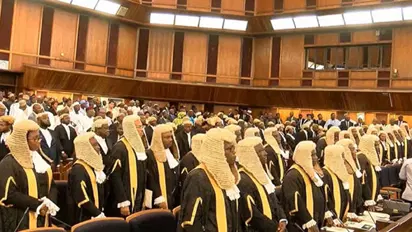The Human and Environmental Development Agenda (HEDA) Resource Centre has raised an alarm over corrupt practices within Nigeria’s judiciary, warning that these issues pose a serious threat to the nation’s democracy and unity.
Chairman of HEDA, Mr. Olanrewaju Suraju, made this assertion in Uyo, the Akwa Ibom State capital, while addressing stakeholders at the 37th Anti-Corruption Situation Room (ACSR), themed “Addressing Corruption in the Judiciary and Providing Effective Strategies for Transparency and Accountability.”
Suraju noted that although discussions around corruption in the judiciary have persisted for years, they have grown louder recently due to conflicting judgments from courts of concurrent jurisdiction. He emphasized that issues such as the manipulation of election-related cases and the use of bribes to influence judicial decisions have compromised the integrity, accountability, and transparency of the judicial process, ultimately hindering democratic progress.
“The National Bureau of Statistics’ (NBS) 2024 Corruption Survey, released in July 2024, made alarming revelations about corruption in the judiciary,” Suraju said. “The report indicated that roughly $1.23 billion (N721 billion) was paid as bribes to public officials in 2023, with a significant portion allegedly paid to judicial officers. This is especially troubling given the judiciary’s critical role in maintaining stability and protecting citizens from abuses of power, particularly the common man.”
Suraju further highlighted the recent directive by the House of Representatives for its Committee on Constitutional Review to investigate Nigeria’s judicial system. “If the judiciary becomes accessible only to those with deep pockets, our democracy is in grave danger,” he warned.
In response to the crisis, HEDA and its partners convened the 37th ACSR to address the growing threat of corruption in the judiciary. Suraju reiterated that the judiciary, as the “last hope of the common man,” must uphold the highest standards of accountability, transparency, integrity, and ethics.
“We have gathered important stakeholders to discuss this critical issue and, over the course of this two-day event, aim to produce actionable solutions to save the judiciary and, by extension, Nigeria’s democracy and unity,” he added.
In his welcome address, Danilo Campisi, Deputy Country Representative of the United Nations Office on Drugs and Crime (UNODC), represented by Princess Chiferio, commended HEDA for organizing the event. He stressed that strategies to address corruption in the judiciary must focus on improving the lives of citizens, as the progress of any government is reflected in the experiences and perceptions of its people.
“Events like these highlight Nigeria’s commitment to anti-corruption efforts, a key priority of the government’s renewed hope agenda. The progress made towards implementing the national anti-corruption strategy and other sub-national initiatives demonstrates this commitment,” Campisi stated.
The two-day event aims to explore the challenges facing the judiciary and develop evidence-based recommendations and action plans, which will be presented to the Chief Justice of Nigeria, Hon. Justice Kudirat Kekere-Ekun (GCON), for implementation.

